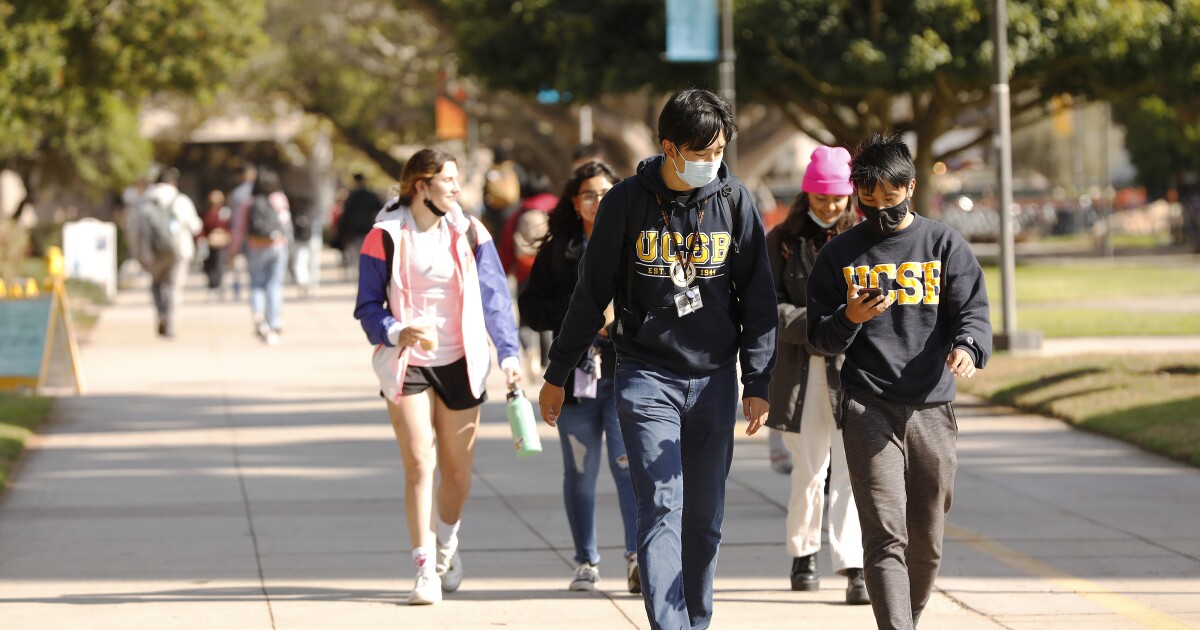The start of 2022 at the University of California feels like March 2020 deja vu for some students.
Most campuses started the winter quarter Monday with two weeks of remote classes — a decision announced days before Christmas as Omicron cases prompted new warnings for caution from health experts and public officials. But the online reality has reminded students of March 2020 when a two-week shutdown turned into campus shutdowns that sundered their traditional college experience. With coronavirus cases rapidly surging, driven largely by younger adults, many students are already wondering if the delay to in-person classes will expand.
“I’m worried that campus will fully lock down as it once did, and that those of us that rely on our campus jobs for income will be left to dry,” said Esmeralda Quintero-Cubillan, 23, who is the UC Student Assn. president. “If I’m honest, I’m concerned that I won’t have an answer until the end of next week.”
Quintero-Cubillan, a resident assistant at UC Santa Barbara, said that roughly 40 of their 80 supervised students have returned to campus to take pre-recorded lectures and read from dorm rooms. And based off more than 2,400 responses to a survey student leaders sent out to UCSB students Monday morning, concerns over basic needs.
“We’re seeing a lot of complaints about accessibility and basic needs over internet and technology,” they said. “It’s eerily similar to last time. We’re hearing a lot of concerns about navigating the technological divide.”
Quintero-Cubillan said that they and other students have found themselves torn — struggling between wanting to remain on campus to experience the final semester of their senior year and have guaranteed housing and income — while remaining fearful about contracting COVID-19.
It’s a balancing act university officials are also trying to navigate.
Most University of California campuses are kicking off the winter quarter remotely for the first two weeks, hoping to control the campus outbreaks. UC Davis is going remote for only one week and Berkeley and Merced — the only two UC campuses on a semester system — haven’t announced plans for a remote start because their semesters don’t start until later this month.
UC Santa Barbara is requiring all students to get tested before returning to campus and said that although campus is slated to reopen on Jan. 18, plans for the quarter are “subject to reassessment.” At UC San Diego, students are required to take a PCR test on the day they return to campus. Weekly testing is encouraged, but not required, for those who are fully vaccinated. The campus is also offering rapid PCR tests via vending machines.
Coronavirus cases are surging at UCSD, said UCSD’s President of Associated Students Manu Agni. At least 189 students residing on campus have tested positive for the virus as well as more than 430 students living off-campus, according to university data.
Agni, who is taking virtual classes and partaking in club meetings from his bedroom, called it a somber start to the new year.
“It kind of feels like we had a year and a half of being locked down, then one quarter of freedom, if you will, and now we’re backsliding into being remote again,” Agni, 21, said.
At UCLA, rigorous testing protocols are in place. Students are required to come back to campus by Sunday and get tested for COVID-19 at least three times before classes begin on Jan. 18.
Students are first expected to test via a healthcare provider no more than 72 hours before returning to the Westwood neighborhood and then take a rapid test provided by the university upon returning to campus. A third test, obtained through a UCLA vending machine or a campus distribution center that will be submitted for lab analysis, is required no later than Jan. 13. Regardless of vaccination status, all students are required to test at least once a week throughout the winter quarter. Any student with a positive test result will have to isolate for 10 days.
Booster shots will be required at UC campuses by the end of the month, as well as at California State University.
Cal State campuses don’t start until late January, which is a key reason that remote plans are not in place, Chancellor Joseph I. Castro told The Times last month. He noted that the situation will be monitored and each university president has the power to make changes “based on local conditions.”
In a letter to students last week, Cal State L.A. President William Covino said that the university is still planning to reopen on Jan. 24, per guidance from public health officials.
“Along with other similarly situated local universities, we will continue to monitor the situation and determine the best approach for the spring semester. I met today with the director of the Los Angeles County Department of Public Health, who did not advise that we change our current schedule. We will announce any changes in advance of January 24,” Covino wrote.
Agni, who knows of at least two dozen people who currently have COVID-19, said that the start of the quarter feels like “spring 2020: part two” and that he wouldn’t be surprised if two weeks of remote school stretched beyond. He hopes the university will provide a definitive answer next week of whether classes will stay remote throughout the rest of the quarter, or if students will be allowed to return for in-person learning.
“My hope is that even if we have to go fully remote for winter quarter, that might be worth it to have spring in-person and, most importantly, spring commencement in-person,” he said.
Stay connected with us on social media platform for instant update click here to join our Twitter, & Facebook
We are now on Telegram. Click here to join our channel (@TechiUpdate) and stay updated with the latest Technology headlines.
For all the latest Education News Click Here

